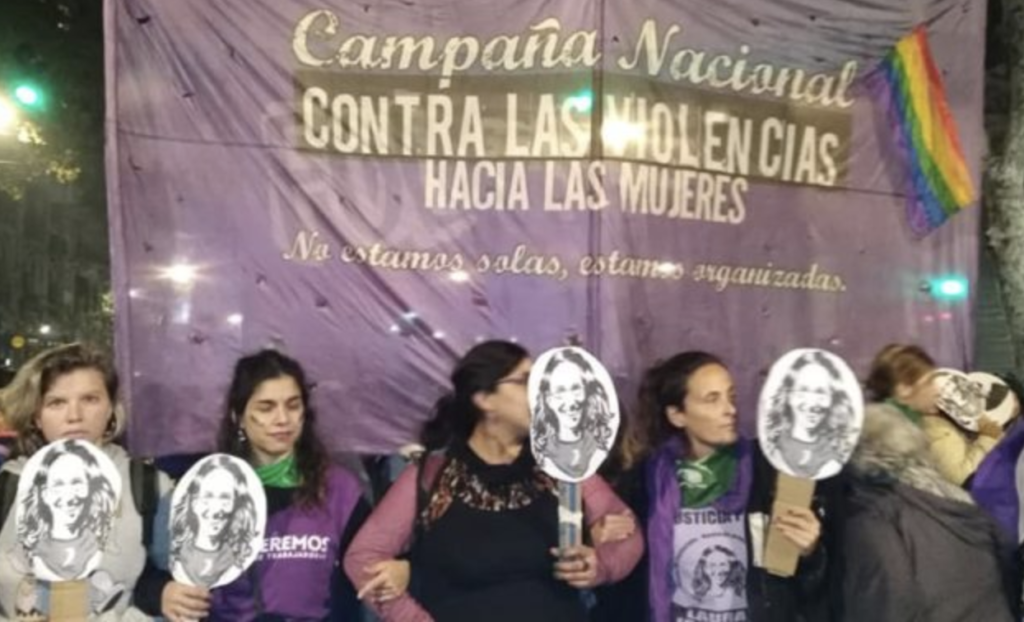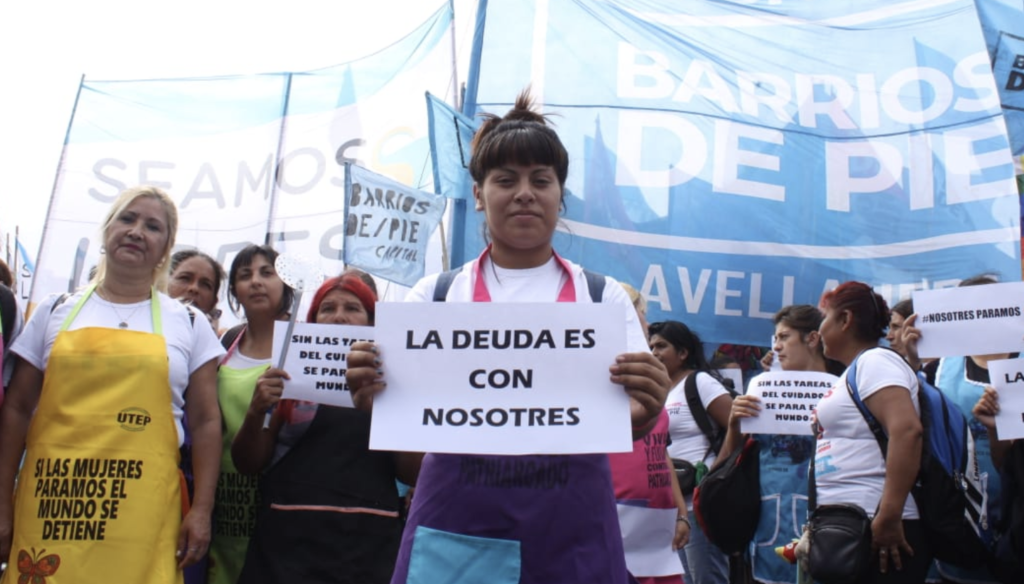An article by Italian feminist, Laura Corradi. Translated by Miriam Gioia Sessa. An article in response to one more case of violence carried out by an activist against a woman of his organization. As so often in these cases not only his comrades but even some of the women involved have opposed to openly criticize and discuss it, as presumably this would be exploited by the Right. Corradi present a powerful argument against this practice. We publish it because what has been taking place in Italy is far from unique, and it is crucial that women who call themselves feminists do not find justification for a behavior that perpetuates the worse forms of patriarchal power and is destructive of the efforts we are making to create more just society. “In a city we cannot name, in a social centre we cannot name, during a national meeting we cannot name, a woman comrade was raped by a male “comrade”. Download article here.
Pandemics / Pandemias
Voluntary Termination of Debt
Luci Cavallero & Verónica Gago
Translated by Liz Mason-Deese
The feminist movement in Argentina, and across Latin America, has gained force and strength in recent years. That movement can be characterized not only by its massiveness in terms of the number of people on the streets, but also for how it has opened up debates and circulated concepts and diagnoses about multiple issues. That broad, heterogeneous, and complex arch includes issues ranging from abortion to debt. However, the movement goes a step further, connecting those problems, creating subterranean links and intersections that have grown to be part of a new common vocabulary and unprecedented form of collective comprehension. Therefore, it is not only an agenda, although it is also that. The feminist movement politicizes issues that were long considered marginal or to only concern a minority, or that had been hijacked by groups of experts. It also connects areas of the exploitation of life that appear to be disconnected or are treated as independent variables by mainstream economics.
A Feminist Strike against Debt
By Luci Cavallero & Verónica Gago
Translated by Liz Mason-Deese
Recently, the transnational feminist movement has taken up the struggle against debt as a banner of struggle as part of the dynamics of the feminist strike. Around the world we have said, “We want ourselves alive and debt free!” (Argentina), “It is us against debt!” (Puerto Rico), “They owe us a Life!” (Chile), “We don’t owe, we won’t pay!” (Spain). It is historic: the feminist movement is politicizing, at the mass scale, the financial issue. And, it is a feminist analysis of debt that allows us to rethink economic violence in terms of its relation with sexist violence. The feminist strike, by denouncing the debt with the International Monetary Fund and private creditors and its impact on household debts, continues to make other debts appear, rendering them visible and reclaiming them. While the bondholders and investment funds apply pressure to collect on all of their investments, on the streets it becomes clear that we are the creditors.
Coronavirus: Todos somos mortales. Del significante vacío a la naturaleza abierta de la historia.
Artículo de Rita Segato. Han circulado en estos días un número significativo de textos, muchos de ellos escritos por autores influyentes. Ellos intentan dar cuenta de dos aspectos distintos de la pandemia que nos aflige. Un grupo hace apuestas a lo que puede haber sido el origen del virus, dividiéndose entre aquéllas que adhieren a la teoría del complot y las otras que, sin necesariamente saberlo, dan continuidad a lo que ya Marx llamaba “ruptura metabólica” o desequilibrio de la relación entre los seres humanos con la naturaleza. Leer más.
Silvia Federici #Luchasporlavida
Conversación con Silvia Federici. La crisis del coronavirus no es sino otra vuelta de tuerca de la guerra del capital contra la vida. Destrucción del medioambiente y recortes de servicios sanitarios, empobrecimiento generalizado y privatización de los cuidados están en su origen y en el alcance de sus consecuencias. El capitalismo no es capaz de asegurar, no ya el bienestar, ni siquiera la supervivencia de las sociedades. En momentos como este todo el mundo ve que el emperador está desnudo, se hace visible la interdependencia de cada un* con l*s demás a la hora de proteger nuestra salud, bienestar y afectos, así como nuestra inserción en flujos naturales que nos superan por completo. Y más visible también el desigual aporte de personas, clases y países a las tareas y procesos de reproducción de la vida. Es momento pues de cambiar las prioridades del sistema económico y social, tenemos la legitimidad de exigir poner las vidas en el centro, no solo durante la cuarentena, sino de forma definitiva. Ver video.
Violencias de género en cuarentena

Episodio XVII
REVISTA DE APARICIÓN ESPORÁDICA IGNORANTES. El 20 de marzo, por medio del DNU 297/2020, el gobierno nacional decretó la medida de “aislamiento social, preventivo y obligatorio” (…) a fin de prevenir la circulación y el contagio del virus COVID-19”. Desde ese día se registraron (al menos) 17 femicidios (según publicó el portal Plusnoticias, al 10/4) que se agregan a los 86 femicidios y 16 trans/travesticidios contabilizados en lo que va del 2020. Claramente nos encontramos ante un estado excepcional del cual no tenemos antecedentes bajo administraciones democráticas y se impone en el corto plazo la necesidad de contar con análisis interseccionales sobre las violencias en períodos de pandemia, para construir herramientas que nos permitan medir y caracterizar su impacto, con el objetivo de establecer procedimientos específicos –y urgentes– para abordarlas en estos nuevos escenarios. Leer más.
Debate con Rafaela Pimentel y Marta Malo #LuchasporlaVida
La Editorial Traficantes de Sueños tenía previsto publicar este mes Los talleres ocultos del capital. Un mapa para la izquierda, una compilación de artículos de Nancy Fraser en los que analiza las condiciones de posibilidad subyacentes a la economía visible, “productiva”: los procesos de reproducción asimétricos en cuanto al género, la dinámica racializada y de clase de la expropiación así como la depredación sistemática de los ecosistemas.
Proponemos debatir sobre #LuchasporlaVida a partir de “Las contradicciones del capital y de los cuidados”, un artículo incluido en este volumen y también publicado en la New Left Review, con Rafaela Pimentel, miembro de Territorio Doméstico, y Marta Malo, activista y traductora de Mariarosa Dalla Costa y Silvia Federici, entre otras. Nancy Fraser es profesora de Filosofía y Política «Henry A. y Louise Loeb» en la New School for Social Research y en TdS también hemos publicado Fortunas del feminismo y ¿Redistribución o reconocimiento?, su debate con Judith Butler. Ver conversación.
Cuando la normalidad es el problema: Repensar la interdependencia para enfrentar la pandemia.
Una conversación entre Cristina Vega, Mina Navarro, Ximena Antillón y Ángel Ruíz. ¿Qué otras formas de vínculos solidarios hemos visto frente a la pandemia? Una reflexión sobre la “normalidad” y las cosas que debieran cambiar luego de vivir este contexto global de crisis sanitaria. Compartir experiencias y construir respuestas solidarias y comunitarias, aprendiendo de colectivos de víctimas. Articulaciones, diálogos sobre COVID-19, derechos y desigualdades, busca abrir un espacio de reflexión y conversación sobre los derechos de todas y todos en este panorama global de contingencia.
#Articulaciones #Fundar #COVID19 Fundar es una organización plural, independiente y sin afiliación partidista dedicada al análisis presupuestario, la transparencia y defensa y promoción de derechos humanos. http://fundar.org.mx/
The Black Plague

An article by Keeanga-Yamahtta Taylor. Public officials lament the way that the coronavirus is engulfing black communities. The question is, what are they prepared to do about it? The old African-American aphorism “When white America catches a cold, black America gets pneumonia” has a new, morbid twist: when white America catches the novel coronavirus, black Americans die. Read more.
Leer en español.
Feminism, the Pandemic, and What Comes Next

An article by LUCÍA CAVALLERO AND VERÓNICA GAGO \\ TRANSLATED BY LIZ MASON-DEESE. It is impossible to trivialize the images of pain that have been circulating for weeks. Across the planet, the virus has accelerated our comprehension of neoliberalism’s deadly mechanisms, the operation of its power over bodies. We could say that there is nothing new about this. Neoliberalism has shown that it can coexist perfectly with death machines, such as those at work in refugee camps and at borders, to name the most brutal examples. But now the virus, which does not discriminate by class or passport, has shown neoliberal life to be a spectacle that we watch online, accompanied by a necropolitical body count rising in real time. There are two arguments that do not convince us: a quick death certificate for capitalism and, as a counterpoint, the insistence that the pandemic confirms capitalism’s totalitarian control over life. Read more.
